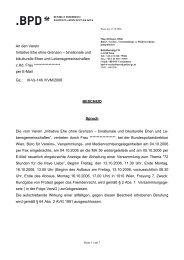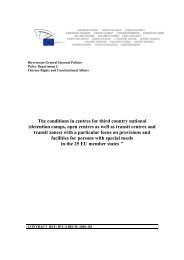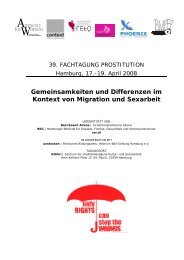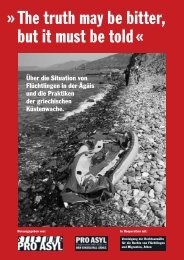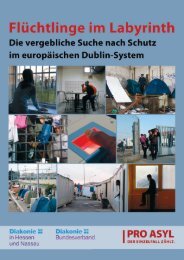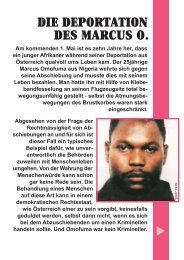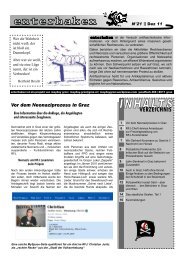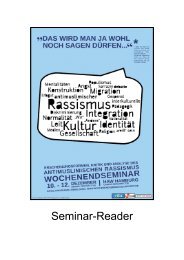Turin's CIE - International University College of Turin
Turin's CIE - International University College of Turin
Turin's CIE - International University College of Turin
You also want an ePaper? Increase the reach of your titles
YUMPU automatically turns print PDFs into web optimized ePapers that Google loves.
II.<br />
FAMILY RELATIONSHIPS, CHILDREN AND <strong>CIE</strong><br />
1. LEGAL FRAMEWORK: THE RIGHT TO FAMILY AND PRIVATE LIFE<br />
A significant portion <strong>of</strong> <strong>CIE</strong> detainees have family members such as children, a husband, a wife<br />
or a long-term partner who live in Italy. Some detainees have also resided in Italy for many<br />
years and consequently they have established their lives here. A long-term immigrant can end<br />
up in <strong>CIE</strong> for a number <strong>of</strong> reasons. The most common <strong>of</strong> these are: residence permits expiring<br />
without renewal, residence permits being terminated due to either loss <strong>of</strong> employment or<br />
criminal conduct, or never having had an Italian visa in the first place.<br />
Council <strong>of</strong> Europe<br />
The right to respect everyone’s private and family life is protected by human rights laws at<br />
European Union, Council <strong>of</strong> Europe and international levels. Article 8 <strong>of</strong> the ECHR states:<br />
“8(1) Every-one has the right to respect for his private and family life, his home and his<br />
correspondence.<br />
8(2) There shall be no interference by a public authority with the exercise <strong>of</strong> this right<br />
except such as is in accordance with the law and is necessary in a democratic society in<br />
the interests <strong>of</strong> national security, public safety or the economic well-being <strong>of</strong> the<br />
country, for the prevention <strong>of</strong> disorder or crime, for the protection <strong>of</strong> health or morals,<br />
or for the protection <strong>of</strong> the rights and freedoms <strong>of</strong> others.”<br />
Article 8 ECHR is both a positive and negative right. Whilst a fundamental aim <strong>of</strong> Article 8 ECHR<br />
is to “protect the individual against arbitrary action by the public authorities”, there may also be<br />
positive obligations inherent in effective “respect” for family life” 18 . The implementation <strong>of</strong><br />
Article 8 ECHR is complex and the article does not specify conditions under which an irregular<br />
immigrant can be detained or deported. However, some <strong>of</strong> the findings in this chapter do call<br />
into question whether Italian authorities are consistently and proportionately balancing the<br />
right to family and private life with infringements that are necessary to pursue a legitimate aim<br />
that is necessary in a democratic society 19 .<br />
European Union Law<br />
The importance <strong>of</strong> the right to respect family and private life is echoed in EU Directive<br />
2003/86/EC <strong>of</strong> 22 September 2003 20 on the right to family reunification. Furthermore, EU<br />
Directive 2008/115/EC <strong>of</strong> 16 December 2008 21 (“Return Directive”) establishes common<br />
standards and procedures for EU Member States in cases in which third-country nationals may<br />
be removed from their territories. The Return Directive specifically states that Member States<br />
18 Kroon and Others v. The Netherlands, 18535/91, 27 October 1994, para. 31. See also, Gül v. Switzerland,<br />
53/1995/559/645, Council <strong>of</strong> Europe: European Court <strong>of</strong> Human Rights, 22 January 1996, para. 38.<br />
19 On the proportionality test, see for example: Mubilanzila Mayeka and Kaniki Mitunga v. Belgium, 13178/03,<br />
Council <strong>of</strong> Europe: European Court <strong>of</strong> Human Rights, 12 October 2006; A.W. Khan v. United Kingdom,<br />
47486/06, Council <strong>of</strong> Europe: European Court <strong>of</strong> Human Rights, 12 January 2010; Tuquabo-Tekle and Others v.<br />
the Netherlands, 60665/00, Council <strong>of</strong> Europe: European Court <strong>of</strong> Human Rights,19 October 2004.<br />
20 Council Directive 2003/86/EC <strong>of</strong> 22 September 2003 on the right to family reunification, L 251/12 Official<br />
Journal <strong>of</strong> the European Union, 3.10.2003.<br />
21 Directive 2008/115/EC <strong>of</strong> the European Parliament and <strong>of</strong> the Council <strong>of</strong> 16 December 2008 on common<br />
standards and procedures in Member States for returning illegally staying third-country nationals, L 348/98<br />
Official Journal <strong>of</strong> the European Union, 24.12.2008.<br />
18 | P a g e




